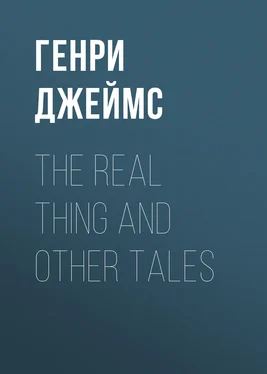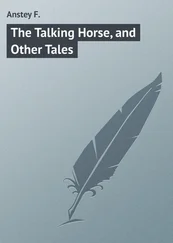Генри Джеймс - The Real Thing and Other Tales
Здесь есть возможность читать онлайн «Генри Джеймс - The Real Thing and Other Tales» — ознакомительный отрывок электронной книги совершенно бесплатно, а после прочтения отрывка купить полную версию. В некоторых случаях можно слушать аудио, скачать через торрент в формате fb2 и присутствует краткое содержание. Жанр: foreign_prose, foreign_antique, на английском языке. Описание произведения, (предисловие) а так же отзывы посетителей доступны на портале библиотеки ЛибКат.
- Название:The Real Thing and Other Tales
- Автор:
- Жанр:
- Год:неизвестен
- ISBN:нет данных
- Рейтинг книги:4 / 5. Голосов: 1
-
Избранное:Добавить в избранное
- Отзывы:
-
Ваша оценка:
- 80
- 1
- 2
- 3
- 4
- 5
The Real Thing and Other Tales: краткое содержание, описание и аннотация
Предлагаем к чтению аннотацию, описание, краткое содержание или предисловие (зависит от того, что написал сам автор книги «The Real Thing and Other Tales»). Если вы не нашли необходимую информацию о книге — напишите в комментариях, мы постараемся отыскать её.
The Real Thing and Other Tales — читать онлайн ознакомительный отрывок
Ниже представлен текст книги, разбитый по страницам. Система сохранения места последней прочитанной страницы, позволяет с удобством читать онлайн бесплатно книгу «The Real Thing and Other Tales», без необходимости каждый раз заново искать на чём Вы остановились. Поставьте закладку, и сможете в любой момент перейти на страницу, на которой закончили чтение.
Интервал:
Закладка:
Henry James
The Real Thing and Other Tales
THE REAL THING
I
When the porter’s wife (she used to answer the house-bell), announced “A gentleman—with a lady, sir,” I had, as I often had in those days, for the wish was father to the thought, an immediate vision of sitters. Sitters my visitors in this case proved to be; but not in the sense I should have preferred. However, there was nothing at first to indicate that they might not have come for a portrait. The gentleman, a man of fifty, very high and very straight, with a moustache slightly grizzled and a dark grey walking-coat admirably fitted, both of which I noted professionally—I don’t mean as a barber or yet as a tailor—would have struck me as a celebrity if celebrities often were striking. It was a truth of which I had for some time been conscious that a figure with a good deal of frontage was, as one might say, almost never a public institution. A glance at the lady helped to remind me of this paradoxical law: she also looked too distinguished to be a “personality.” Moreover one would scarcely come across two variations together.
Neither of the pair spoke immediately—they only prolonged the preliminary gaze which suggested that each wished to give the other a chance. They were visibly shy; they stood there letting me take them in—which, as I afterwards perceived, was the most practical thing they could have done. In this way their embarrassment served their cause. I had seen people painfully reluctant to mention that they desired anything so gross as to be represented on canvas; but the scruples of my new friends appeared almost insurmountable. Yet the gentleman might have said “I should like a portrait of my wife,” and the lady might have said “I should like a portrait of my husband.” Perhaps they were not husband and wife—this naturally would make the matter more delicate. Perhaps they wished to be done together—in which case they ought to have brought a third person to break the news.
“We come from Mr. Rivet,” the lady said at last, with a dim smile which had the effect of a moist sponge passed over a “sunk” piece of painting, as well as of a vague allusion to vanished beauty. She was as tall and straight, in her degree, as her companion, and with ten years less to carry. She looked as sad as a woman could look whose face was not charged with expression; that is her tinted oval mask showed friction as an exposed surface shows it. The hand of time had played over her freely, but only to simplify. She was slim and stiff, and so well-dressed, in dark blue cloth, with lappets and pockets and buttons, that it was clear she employed the same tailor as her husband. The couple had an indefinable air of prosperous thrift—they evidently got a good deal of luxury for their money. If I was to be one of their luxuries it would behove me to consider my terms.
“Ah, Claude Rivet recommended me?” I inquired; and I added that it was very kind of him, though I could reflect that, as he only painted landscape, this was not a sacrifice.
The lady looked very hard at the gentleman, and the gentleman looked round the room. Then staring at the floor a moment and stroking his moustache, he rested his pleasant eyes on me with the remark:
“He said you were the right one.”
“I try to be, when people want to sit.”
“Yes, we should like to,” said the lady anxiously.
“Do you mean together?”
My visitors exchanged a glance. “If you could do anything with me , I suppose it would be double,” the gentleman stammered.
“Oh yes, there’s naturally a higher charge for two figures than for one.”
“We should like to make it pay,” the husband confessed.
“That’s very good of you,” I returned, appreciating so unwonted a sympathy—for I supposed he meant pay the artist.
A sense of strangeness seemed to dawn on the lady. “We mean for the illustrations—Mr. Rivet said you might put one in.”
“Put one in—an illustration?” I was equally confused.
“Sketch her off, you know,” said the gentleman, colouring.
It was only then that I understood the service Claude Rivet had rendered me; he had told them that I worked in black and white, for magazines, for story-books, for sketches of contemporary life, and consequently had frequent employment for models. These things were true, but it was not less true (I may confess it now—whether because the aspiration was to lead to everything or to nothing I leave the reader to guess), that I couldn’t get the honours, to say nothing of the emoluments, of a great painter of portraits out of my head. My “illustrations” were my pot-boilers; I looked to a different branch of art (far and away the most interesting it had always seemed to me), to perpetuate my fame. There was no shame in looking to it also to make my fortune; but that fortune was by so much further from being made from the moment my visitors wished to be “done” for nothing. I was disappointed; for in the pictorial sense I had immediately seen them. I had seized their type—I had already settled what I would do with it. Something that wouldn’t absolutely have pleased them, I afterwards reflected.
“Ah, you’re—you’re—a—?” I began, as soon as I had mastered my surprise. I couldn’t bring out the dingy word “models”; it seemed to fit the case so little.
“We haven’t had much practice,” said the lady.
“We’ve got to do something, and we’ve thought that an artist in your line might perhaps make something of us,” her husband threw off. He further mentioned that they didn’t know many artists and that they had gone first, on the off-chance (he painted views of course, but sometimes put in figures—perhaps I remembered), to Mr. Rivet, whom they had met a few years before at a place in Norfolk where he was sketching.
“We used to sketch a little ourselves,” the lady hinted.
“It’s very awkward, but we absolutely must do something,” her husband went on.
“Of course, we’re not so very young,” she admitted, with a wan smile.
With the remark that I might as well know something more about them, the husband had handed me a card extracted from a neat new pocket-book (their appurtenances were all of the freshest) and inscribed with the words “Major Monarch.” Impressive as these words were they didn’t carry my knowledge much further; but my visitor presently added: “I’ve left the army, and we’ve had the misfortune to lose our money. In fact our means are dreadfully small.”
“It’s an awful bore,” said Mrs. Monarch.
They evidently wished to be discreet—to take care not to swagger because they were gentlefolks. I perceived they would have been willing to recognise this as something of a drawback, at the same time that I guessed at an underlying sense—their consolation in adversity—that they had their points. They certainly had; but these advantages struck me as preponderantly social; such for instance as would help to make a drawing-room look well. However, a drawing-room was always, or ought to be, a picture.
In consequence of his wife’s allusion to their age Major Monarch observed: “Naturally, it’s more for the figure that we thought of going in. We can still hold ourselves up.” On the instant I saw that the figure was indeed their strong point. His “naturally” didn’t sound vain, but it lighted up the question. “ She has got the best,” he continued, nodding at his wife, with a pleasant after-dinner absence of circumlocution. I could only reply, as if we were in fact sitting over our wine, that this didn’t prevent his own from being very good; which led him in turn to rejoin: “We thought that if you ever have to do people like us, we might be something like it. She , particularly—for a lady in a book, you know.”
Читать дальшеИнтервал:
Закладка:
Похожие книги на «The Real Thing and Other Tales»
Представляем Вашему вниманию похожие книги на «The Real Thing and Other Tales» списком для выбора. Мы отобрали схожую по названию и смыслу литературу в надежде предоставить читателям больше вариантов отыскать новые, интересные, ещё непрочитанные произведения.
Обсуждение, отзывы о книге «The Real Thing and Other Tales» и просто собственные мнения читателей. Оставьте ваши комментарии, напишите, что Вы думаете о произведении, его смысле или главных героях. Укажите что конкретно понравилось, а что нет, и почему Вы так считаете.












